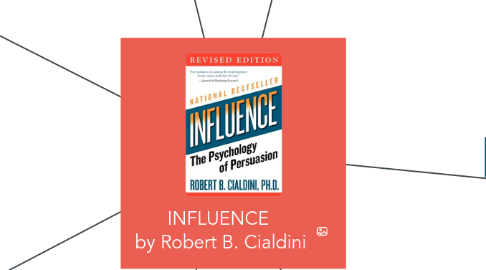
1. CONSISTENCY
1.1. We want to stay true to our word.
1.1.1. We want our actions to be consistent with what we've said.
1.2. Once we commit to something with words or actions, we want to be consistent with that commitment.
1.2.1. Especially powerful are...
1.2.1.1. Public commitments
1.2.1.2. Written words signed by yourself
1.3. Good example: Foot-in-the-door sales technique
1.3.1. Even a small commitment affects our self-image
1.3.2. The salesperson tries to get you to make a very small purchase
1.3.2.1. This small commitment changes your self-perception into one of a customer, making you open to bigger purchases down the line
1.4. What you can do
1.4.1. Be wary of even small things that companies and sales people want you to purchase
2. CONSENSUS
2.1. Social proof: We often decide what the right course of action is by looking at others' behavior.
2.1.1. Particularly powerful when we face uncertainty.
2.2. People who are similar to us can greatly influence our choices.
2.2.1. See also: Werther Effect
2.3. This is why marketers often use interviews with ordinary people in their advertisements > It's social proof
2.4. What you can do
2.4.1. Be alert for counterfeit social proof
2.4.2. If the quotes are clearly scripted, avoid the product and the company behind it
3. LIKING
3.1. We comply with people we like.
3.1.1. And for some people, it is very easy to make us like them.
3.2. Salespeople will often compliment and flatter you, and pretend to have something in common with you
3.2.1. We respond well to flattery and similarity and quickly start to like those people
3.3. Physical attractiveness also plays a role
3.3.1. Produces a halo effect: we automatically see attractive people also as smart, kind and honest
3.4. Cooperating for a shared goal also helps
3.4.1. Example: Good copy - bad cop
3.5. What you can do
3.5.1. Ask yourself if you have come to like something/someone unusually strongly in a short time
3.5.2. If so, this could be due to manipulation, and you should be on alert.
4. AUTHORITY
4.1. We obey authorities without question.
4.1.1. Mere symbols of authority can already make us comply.
4.2. We are taught from birth to obey figures of authority such as teachers, cops, parents.
4.2.1. Authority negates independent thinking
4.3. Symbols of authority also influence us
4.3.1. Titles
4.3.1.1. Faced with a 'Professor' for instance, we automatically become more respectful and accepting of their opinions
4.3.2. Clothes and props
4.3.2.1. e.g. uniforms, suits, robes etc.
4.4. What you can do:
4.4.1. Ask yourself if the person is a real authority figure or just pretending to be one
4.4.2. Ask yourself if the person has your best interests at heart
5. This is a summary of "Influence - The Psychology of Persuasion". The book explains the psychology of why people say "yes"—and how to apply these understandings.
5.1. Watch the Video: The Science of Persuasion
5.2. About the Author
5.2.1. Robert B. Cialdini, Ph.D.
5.2.1.1. Dr. Robert Cialdini is the seminal expert in the rapidly expanding field of influence and persuasion
5.2.1.2. Born April 27, 1945
5.2.2. Website
5.2.2.1. influenceatwork.com
5.2.3. Twitter
5.2.3.1. @RobertCialdini
5.2.4. YouTube Channel
5.3. Get INFLUENCE on Amazon
6. RECIPROCATION
6.1. Humans feel obliged to return favors.
6.2. This rule is the foundation of our society
6.2.1. It allows us to share resources because we know we will receive something in return
6.2.2. As a society, we feel disdainful of those who don't reciprocate favors
6.2.3. We label them as moochers or ingrates
6.2.3.1. We fear being labeled as such ourselves
6.3. People are so keen to rid themselves of the burden of reciprocity that they will often return much bigger favors!
6.4. What you can do:
6.4.1. Ask yourself if the favors you receive are genuine, or just attempts to manipulate you
6.4.2. Learn to identify and resist deliberate attempts of people to abuse the reciprocation principle.
7. SCARCITY
7.1. When opportunities become scarce, we desire them more.
7.1.1. We hate missing out!
7.2. Scarcity becomes a powerful influence on our decision-making when...
7.2.1. The availability of the thing in question has decreased suddenly, rather than slowly over time
7.2.2. There is direct competition
7.2.2.1. Can induce 'feeding frenzy' for a scarce good
7.3. What you can do:
7.3.1. Consider whether you really want the item in question because of its use to you, or because of an irrational wish to possess it

